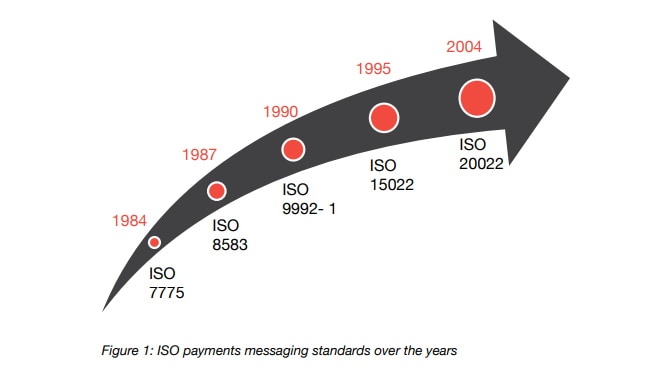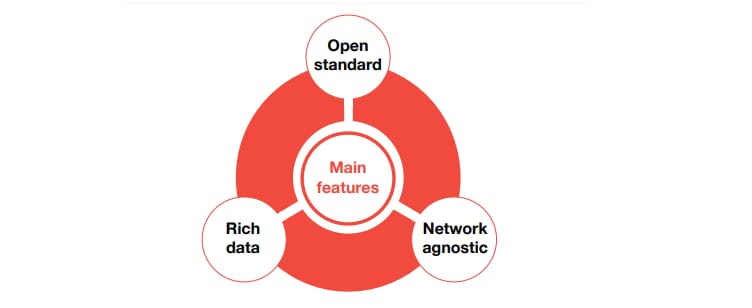Decoding payments message standards
October 2019
The International Organisation for Standardisation (ISO), an international body which sets global and commercial standards worldwide, has defined various standards for facilitating the flow of messages related to payments/financial transactions. Over the years, many countries have adopted various standards for domestic payments transfer such as ISO 8583, ISO 15022, American National Standards Institute (ANSI) X12, and Electronic Data Interchange for Administration, Commerce and Transport (EDIFACT).

Some of the challenges faced by payments messaging standards built decades back are:
The standards heavily use ‘free-format’ fields to convey supporting information, limiting both the extent of data collection in a standard format and performing contextual analysis.
Payments systems using different formats of standardisation results in technical failures, loss of information and non-standardised reporting.
Different applications, resources and skillsets are needed to support various messaging standards. This has a direct impact on costs incurred by firms.
Uniform standards play an effective role in standardising payments flows. With large-scale domestic and international financial transactions being conducted daily, uniform use of standards is essential.
Over the last decade, ISO 20022 has emerged as the key global standard for developing modernised financial market infrastructures. At present, most payment systems follow the ISO 20022 standards, resulting in improved efficiency, lower costs and the avoidance of errors.
ISO 20022 is fast emerging as a global benchmark for successful, real-time, high and low-value payments across domestic, regional and international flows of financial transactions.
Globally, industries are keen to quickly adopt ISO 20022 to reap its benefits. ISO 20022 allows for quicker implementation of payments standards at lower costs, by creating one standardised file format for all financial instruments (FIs) and payment types.
What is ISO 20022?
ISO 20022 was published in 2014. It is a global standard for financial messaging, that provides a standard model across business domains such as payments, securities, trade services, card services, foreign exchange (FX). The standard defines messages with clarity of purpose and convey information between parties within a payment chain. It also defines message specifications for each message type.1
Main features of ISO 20022

Open standard: Specifications are free and available for further development, as it is an open standard and can be continuously modified to meet users’ needs.
Network agnostic: The syntax is inter-operable with computer operating systems across networks.
Increased data carrying capacity and improved structure: More data carrying capacity under ISO 20022 allows for improved identification of the originators and end-beneficiaries of payment instructions.
Messaging standards – a comparisonAreas of intervention
The table below compares ISO 20022 with two popular payments standards: ISO 8583 and ISO 15022.

Key takeaways
ISO 20022 is capable of handling rich data, compared to the other standards.
ISO 20022 is more versatile for integration, though it is mainly developed in XML format, compared to the bit map or free format for ISO 8583/ISO 15022.
ISO 20022 comes with predefined mandatory fields for standardising messages. Institutions can decide on the optional parameters that can be modified for ISO 20022, based on their requirements.
Key considerations and way forward
Implementation of ISO 20022 standards must aim to achieve the intended benefits and take into consideration the various challenges involved.
Intended benefits
Capable of sharing rich information
ISO 20022 is capable of carrying large data sets and messages. Users of the standard can choose the quantity of data to share for necessary insights.
Integration between both domestic and cross-border payments
ISO 20022 is capable of integrating and standardising domestic and cross- border payments in market practices, by rolling out standard guidelines.
Inter-operability and harmonisation
ISO 20022 allows for harmonisation of previously known inter-operable formats, and simplified data consumption and transmission. Underlying syntax of XML and the structured platform makes this standard more feasible for payments.
Efficiency gain and cost-savings
ISO 20022 makes financial messaging more efficient by standardising and harmonising payments message formats, increases straight-through processing (STP) rates, and simplifies cost-intensive processes such as payment processing, investigations, data analytics and reporting.
Challenges
Data truncation
Potential data truncation during the co-existence period comes with a risk for all agents and challenges for the beneficiary. Intermediary service providers can be among the first movers to ensure full data delivery.
Implementation cost
Significant investments in technology and resources by organisations are required to realise the full benefits of ISO 20022. There could be cost implications for direct participants, PSPs and end users, depending upon the level of standard implementation.
Industry-wide effort
Implementation of ISO 20022 recommends a standardised approach, where all stakeholders are expected to put in efforts instead of individual organisations following the standards, adding to the complexity of the implementation.
Challenges of implementation
For accepting a new message type for inbound electronic messages, institutions need to make sure that additional translation utilities are in place. Institutions must ensure that for a certain time period, their systems support both ISO 20022 and the legacy message format.
- Implications for operations
- Implications for regulators
- Implications for business
- Implications for technology
Implications for operations
The ISO 20022 messaging standard will necessitate changes not only in the core payments process, but also in reconciliations, confirmations, cash management, liquidity management and other business functions of financial transactions. ISO 20022 standard messages can carry extensive remittance data, providing companies with the opportunities to automate the reconciliation of payments.
Implications for regulators
ISO 20022 increases transparency and supports financial institutions in securing payment processing compliances, which are subject to regulations by authorities. The implementing country can decide the regulatory norms and guidelines on the structure, settlement and dispute. Domestic central systems would need to play an active role defining, maintaining and settlement of their system build upon the ISO 20022 messaging standard and make it compliant with other regulatory bodies.
Implications for business
The value proposition of ISO 20022 and associated data elements is that it is possible to use predefined vocabulary easily understood across the industry. It aims to provide industry agreed definitions for various financial services terminologies such as accounts, transfers, settlements.
The 3X data storage available with ISO 20022 provides improved data management, along with dashboards providing insights into analytics. This provides a key competitive advantage to the institutions which use it for various payments transaction flows.
Implications for technology
It would be necessary to provide support for both old and new standards for a certain time period. A clear architectural roadmap and planned approach are essential for capitalising the ISO 20022 messaging standard and integration of financial services. Firms should explore the standard-based integration technologies with the new XML-based emerging standards. Institutions should consider deployment of platform-neutral technologies such as ISO 20022 and use them with existing computing infrastructure.
Adaptation methods: Various firms have adopted different approaches for implementing ISO 20022.
Like-for-like: In this adaptation method, rather than enhancing the system, the new ISO 20022 standard message attributes are replicated in the existing financial functionality of an institution. As ISO 20022’s rich functionality is matched to the legacy capability, and as no new functionality is introduced or modified on the existing system, this facilitates end-to-end transaction inter-operability. Typically, ‘like-for-like’ is seen as an intermediate step towards full implementation of ISO 20022. It requires efforts on exploring the ISO 20022 catalogue repository and examining the messaging components, data types and existing data specifications, business process catalogue of the institution and performing the necessary mapping This approach enables institutions to first become ISO 20022-enabled and then to evolve towards full implementation of ISO 20022 at a later stage, with richer services.
This approach is currently being adopted by a significant share of high-value payments market infrastructure around the world.3
Full implementation: It is the approach taken by organisations that want to leverage the full potential of ISO 20022 messages, with the goal of offering additional and/or improved services that take advantage of additional message flows and data elements inherent in the ISO 20022 messaging standard. Alternatively, market infrastructures select a ‘full implementation’ approach when a ‘like-for-like’ approach is simply not practical – for example, where replicating legacy functionality would be too restrictive or too limited.4
Market updates
Implemented and planned adaptation of the ISO 20022 standard by countries across the world

With input from Shekhar Lele, Arun Suresh and Rishi Chowksey.
Payment technology updates
ISO 20022 for API and new technologies
SWIFT
New technologies such as APIs, however, come in all shapes and sizes, using divergent technologies. Without the adoption of common standards, proliferation of APIs is likely to lead to inefficient and ineffective fragmentation, defeating their original purpose.
Dealing with multiple “spinning plates” of the ISO 20022 adoption journey
Volante Tech
As in any implementation project, operational and technical teams are required for installation, testing, parallel runs, and eventual conversion. Adoption of a new standard requires integration of the new formats into every system affected by the new message format.
SWIFT seeks open banking network
Times of India
The hyper-connected future of tomorrow could see us enabling seamless cross-border payment experience via domestic real-time systems, without the need for beneficiary bank account information. Open banking, which will play a big role in this experience, is something SWIFT is building capabilities around.
Financial message automation
Volante Tech
ISO 20022 is just the start. API banking, data lake integration, regulatory reporting, real-time transaction processing and the move to cloud demand a new approach to messaging. Messages and data are the heart of financial services. Payments, capital markets, treasury, trade and other financial businesses generate trillions of messages and terabytes of data every day as they take digital transformation to the next level.
New messaging standards for UK payments: ISO 20o22
Bank of England
The UK payments industry is moving to ISO 20022, which is the emerging global standard for payments messaging. This standard creates a common language for payments data across the globe. To adapt to the new messaging standard and accompanying data requirements, your organisation might have to make process and technology changes.














